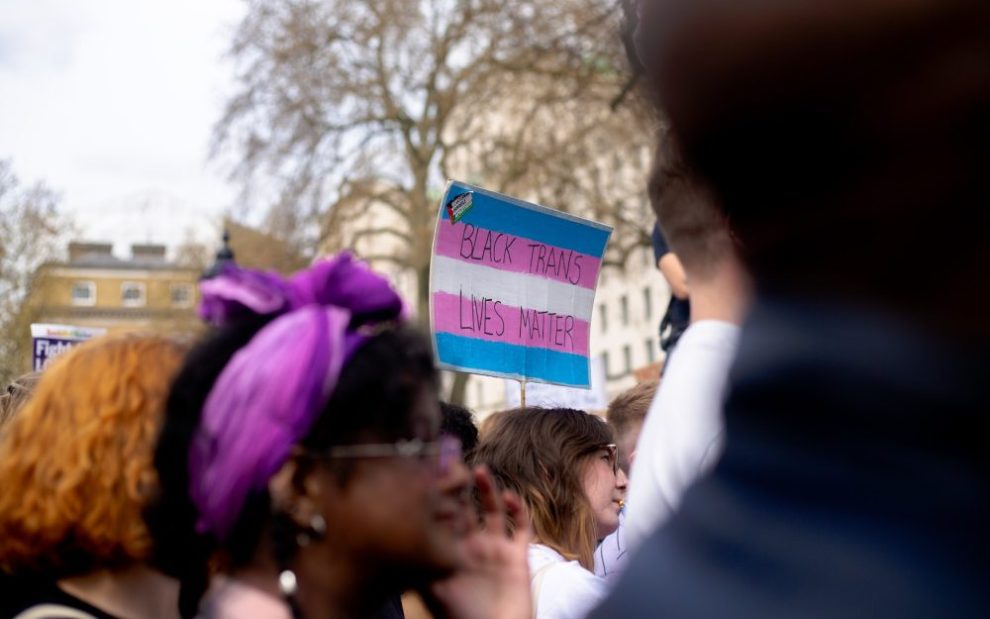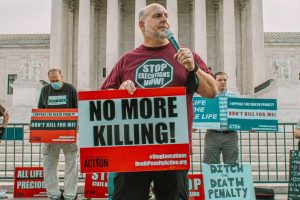To recognize International Transgender Day of Visibility on March 31, the U.S. Federation of the Sisters of St. Joseph, along with the Sisters of Providence of Saint Mary-of-the-Woods, Indiana, and the Sisters of Charity of Leavenworth, Kansas, released a statement in solidarity with people who are transgender, nonbinary, and gender-expansive, affirming that they are “beloved and cherished by God.”
Lisa Cathelyn, a lay partner in mission and justice coordinator for the U.S. Federation of the Sisters of St. Joseph, says these religious communities came together to write the statement, because they share common concerns about the harmful and life-threatening impacts of anti-trans and anti-LGBTQ legislation being written and passed in several states.
“As a group, we discussed how there was very little published in terms of explicitly Catholic support for trans, nonbinary, and gender-expansive folks,” Cathelyn says. “We wished to offer an expression of solidarity and hope. Our collaborative statement is a direct response to this reality of legislation in various states and to honor Trans Day of Visibility.”
International Transgender Day of Visibility started in 2009 when Rachel Crandall-Crocker, a trans woman, wanted to create a day where the trans community could feel celebrated and experience joy in their identities.
The religious communities that signed the statement are recognizing the day by “celebrating, acknowledging, and uplifting” transgender people, while also committing to actions that extend beyond the day’s observance. They seek to offer financial and prayerful support to trans-led organizations, Cathelyn said, and are committing to the “long work of examining our own internal behaviors, policies, and practices.”
“We—vowed religious and their partners in mission—have historically been slow to demonstrate our solidarity with the trans community,” Cathelyn says. “We seek to publicly commit and hold ourselves accountable to ongoing education, evaluation, support, and action, knowing that we are a mix of various charisms, geographies, and histories.”
The Catholic Church, and other Christian institutions and their leaders, are called out in the statement for perpetuating harmful rhetoric against trans and nonbinary people. The gospel, the statement says, compels vowed religious, and all Catholics, to actively interrupt harmful rhetoric and to dismantle systems that reinforce violence, particularly for Black, Indigenous, and other people of color.
“We will remain oppressors until we—as vowed Catholic religious—acknowledge the existence of LGBTQ people in our own congregations,” the statement says.
Cathelyn says these religious communities hope that the statement will “extend care to those who have historically been the most marginalized in our institutional church spaces.”
“I know that releasing a statement is meaningless without concrete calls to action,” she says. “We do not wish to draw attention away from or speak on behalf of trans, nonbinary, and gender-expansive individuals. We are called to be held accountable to them,” she says.
Actions that Catholics can take to stand in solidarity with the transgender community are included in the statement:
- Learn: Check if elected officials are attacking LGBTQ rights in your state legislature with the ACLU Map Tracker: Mapping Attacks on LGBTQ Rights in U.S. State Legislatures
- Support: The Trevor Project, Transgender Law Center, New Ways Ministry, or another organization supporting transgender people.
- Evaluate: Assess your religious community’s capacity to fully welcome trans people, including internal attitudes, behaviors, policies, and having gender-neutral restrooms.
- Act: Consider signing on as an individual, congregation, or organization to the declaration: “Beloved by God.”
“Especially as we approach Holy Week, where we collectively recall Jesus’ life, death, and resurrection, we have to be honest about the forces of empire and death that are at work—in this case, anti-trans and anti-LGBTQ legislation and actions that seek to erase and eliminate certain groups of people,” Cathelyn says. “We must be a force for good, for the gospel of life.”
Image: Unsplash/Karollyne Hubert













Add comment